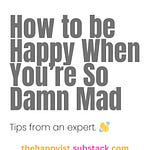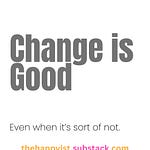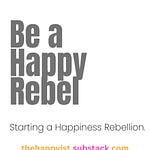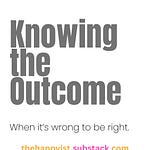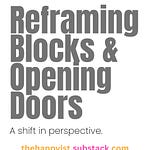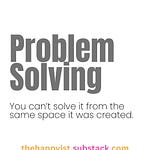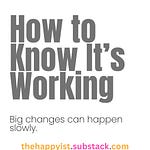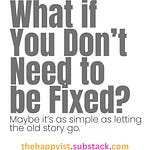Hi, I’m Sandra. Welcome to The Happyist. Here, we get unstuck by being in authentic appreciation and cultivating holistic happiness. It’s easier than it sounds, and fun.
So, let’s get curious.
We’ve been taught that curiosity you-know-what’ed the C-A-T. That makes curiosity dangerous, or at least slightly unsavory. Think Mrs. Kravitz, the nosey neighbor on “Bewitched”. She was the kind of person everyone knew and no one wanted to be…or own up to being. Curiosity is linked to being intrusive or gossipy, almost inappropriate or rude. But, really, curiosity is transformative. Especially when we get curious about ourselves.
Now, why would we need to get curious about ourselves? After all, don’t we already know ourselves? Shouldn’t we be experts and authorities on ourselves just by being ourselves? Well, in theory, maybe. But, really — when we’re honest — we’re not.
We keep a lot from ourselves, don’t we? We repress or compartmentalize, brush things aside. All very normal and human. But it can lead to not great stuff.
How many times have you asked yourself, “Why did I do that?!” or “What was I thinking?!” But those really aren’t introspective questions. Instead, they’re just doorways to criticizing and belittling ourselves.
Let’s not do that because it’s really unproductive and annoying.
We really won’t know ourselves until we get curious about who we are, what we want, why we feel what we feel and do the things we do. We are sort of mysterious beings until we take the time to discover our truest selves. And we do that by asking and answering questions.
Why did I make that decision? Why did I react that way? Why did that bother me so much? Why am I still angry/sad/disappointed by that? Is this really worth being frustrated by? Can I do that better next time?
And when we ask ourselves those questions, we need to come from a place of compassion, openness and love. Because, really, that’s what curiosity is.

If you want to get technical, the definition of the word is: a strong desire to learn or know something. That’s pretty much the opposite of criticism, which is defined as: the expression of disapproval of someone or something based on perceived faults or mistakes.
Don’t you desire to learn more about and understand yourself better? Sounds a lot better to me than the expression of disapproval.
What’s the point of beating yourself up over a mistake or a misstep? How does that help you do better, understand more, or change? It’s unproductive. It’s a harmful waste of time. Get curious instead.
We are fascinating creatures, with all sorts of triggers and drives we have yet to fully discover. And once we understand those triggers and drives, we become empowered. We make better choices. We become less reactive and more responsive. We learn from our mistakes and move forward with that wisdom. And we start to understand why we let ourselves visit the past as often as we do.
When I visit the past, it’s my ego who bought the ticket. My ego wants to go back and relive a situation to change it. Guess what? It doesn’t change. All it does is reactivate that pain, anger, sadness, frustration or disappointment. Because it’s pretty rare that we go back to the past to revisit something good. We do, but we don’t really pack an overnight back or check luggage for those visits, right?
This happened the other day when I was on the last half of my urban hike and something the author of the audiobook I was listening to sparked an unpleasant memory. And my ego was all over that. She went through the old scenario and decided how she wanted to handle it now. And I went on the ride with her, played along a little bit. But then I had to get curious. “Why are we doing this?” I asked. Really, why? What was the point of revisiting something nearly 15 years old?
Because of the fear that situation put me in. And how I wanted that person punished for it.
Listen to this episode with a 7-day free trial
Subscribe to The Happyist to listen to this post and get 7 days of free access to the full post archives.




